A Report on Principles and Practices of Ethical Decision-Making
VerifiedAdded on 2023/06/04
|12
|4078
|109
Report
AI Summary
This report provides a comprehensive analysis of the principles and practices of ethical decision-making, focusing on the organizational context, personal values, and challenges involved. It highlights the importance of ethical considerations in business, using Unilever as a case study to illustrate the complexities of ethical decision-making in a global organization. The report discusses the impact of factors such as business size, diversified products, competition, and global operations on ethical decisions. It also emphasizes the personal values and behaviors necessary for ethical decision-makers, including trustworthiness, respect, responsibility, fairness, caring, and citizenship. Furthermore, the report identifies financial incentives, lack of knowledge, and entitlement as significant challenges to ethical decision-making. Finally, it explores different types and sources of data and information that can inform ethical decisions, including transparency, integrity, and lawfulness.
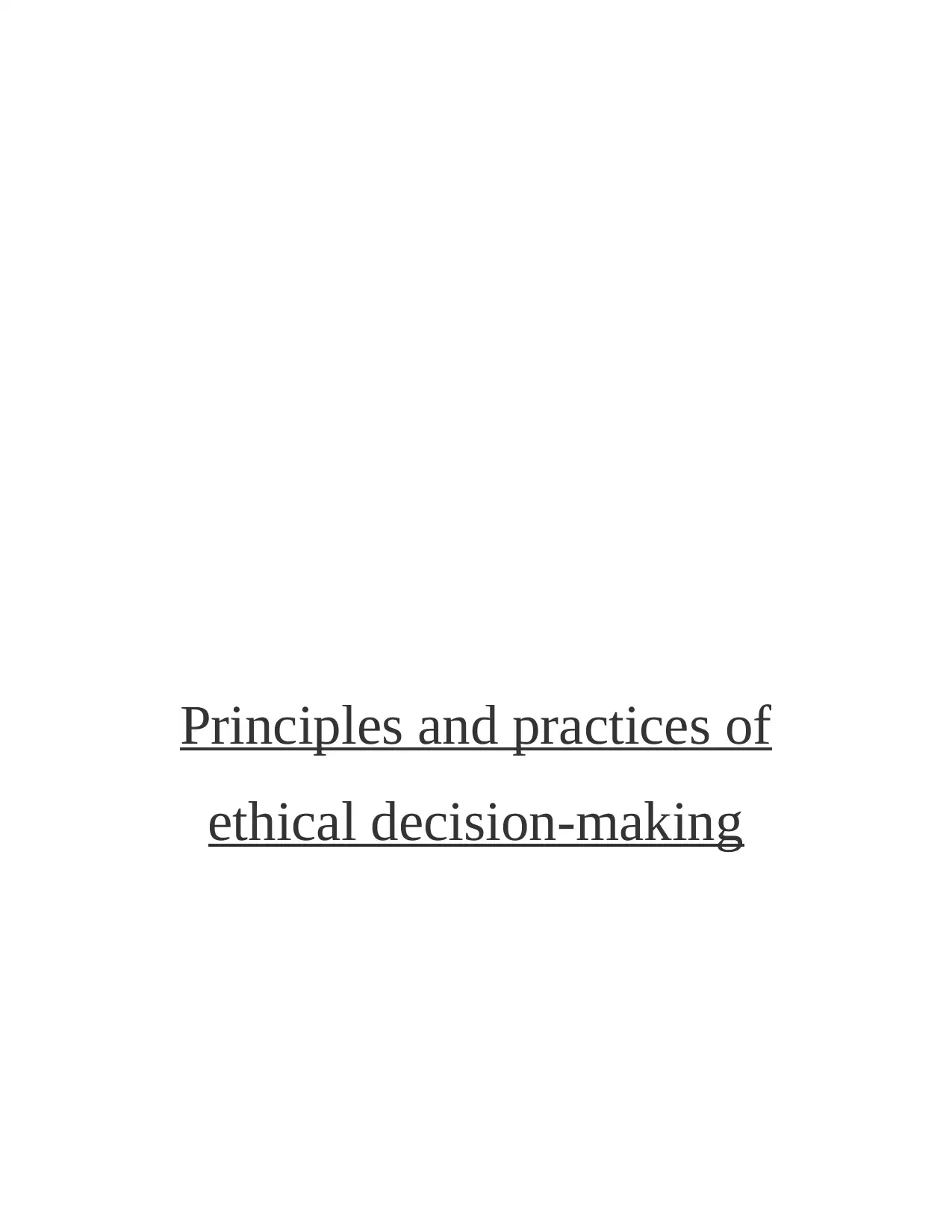
Principles and practices of
ethical decision-making
ethical decision-making
Paraphrase This Document
Need a fresh take? Get an instant paraphrase of this document with our AI Paraphraser
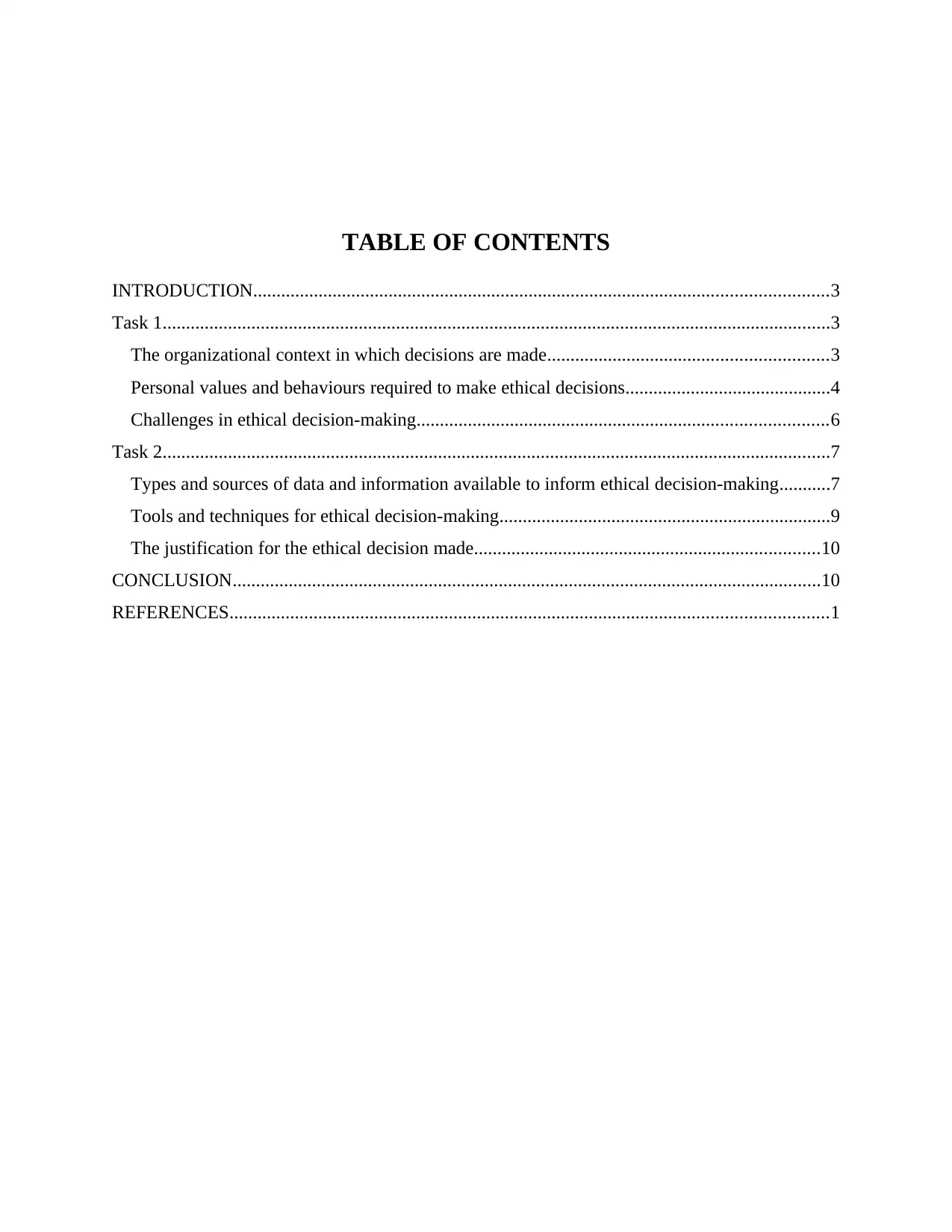
TABLE OF CONTENTS
INTRODUCTION...........................................................................................................................3
Task 1...............................................................................................................................................3
The organizational context in which decisions are made............................................................3
Personal values and behaviours required to make ethical decisions............................................4
Challenges in ethical decision-making........................................................................................6
Task 2...............................................................................................................................................7
Types and sources of data and information available to inform ethical decision-making...........7
Tools and techniques for ethical decision-making.......................................................................9
The justification for the ethical decision made..........................................................................10
CONCLUSION..............................................................................................................................10
REFERENCES................................................................................................................................1
INTRODUCTION...........................................................................................................................3
Task 1...............................................................................................................................................3
The organizational context in which decisions are made............................................................3
Personal values and behaviours required to make ethical decisions............................................4
Challenges in ethical decision-making........................................................................................6
Task 2...............................................................................................................................................7
Types and sources of data and information available to inform ethical decision-making...........7
Tools and techniques for ethical decision-making.......................................................................9
The justification for the ethical decision made..........................................................................10
CONCLUSION..............................................................................................................................10
REFERENCES................................................................................................................................1
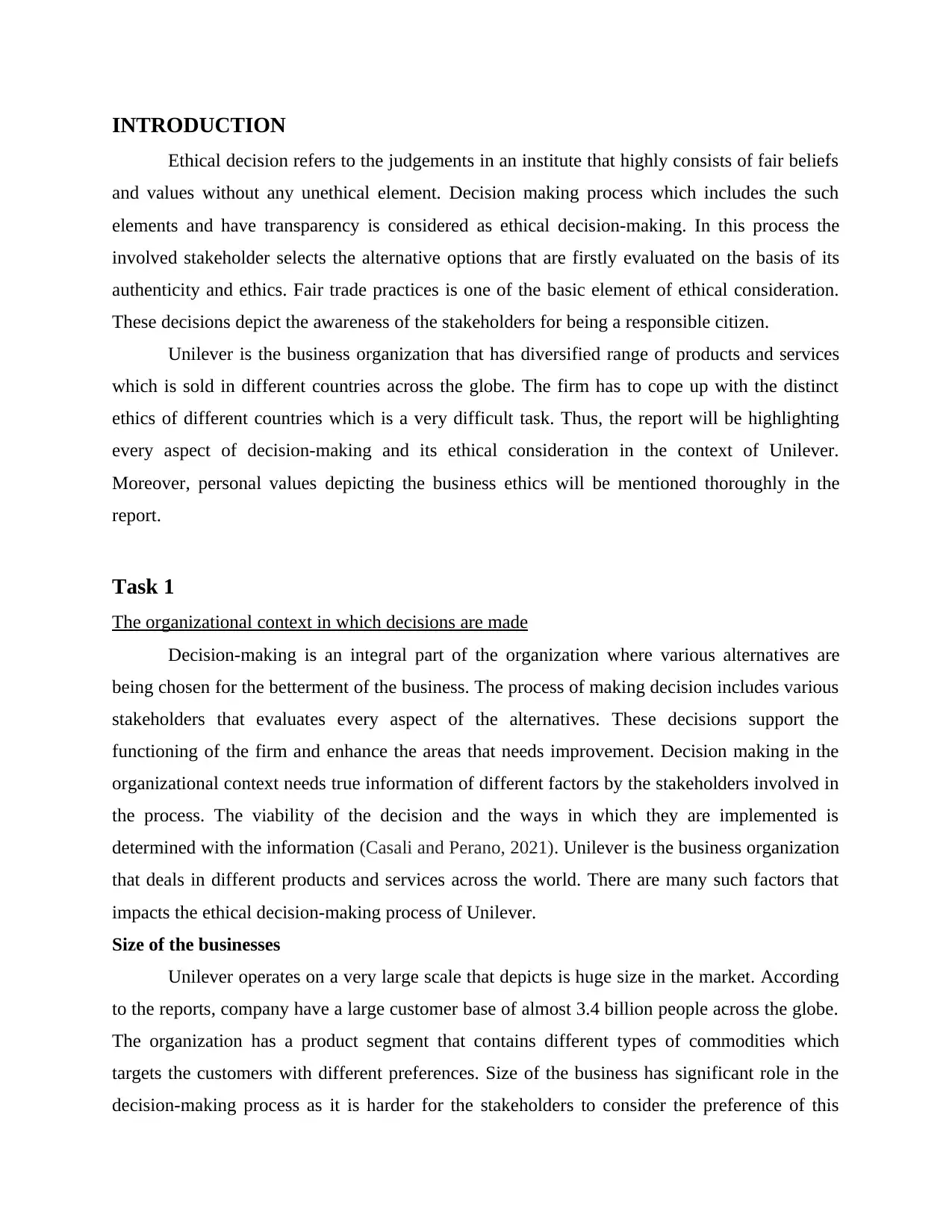
INTRODUCTION
Ethical decision refers to the judgements in an institute that highly consists of fair beliefs
and values without any unethical element. Decision making process which includes the such
elements and have transparency is considered as ethical decision-making. In this process the
involved stakeholder selects the alternative options that are firstly evaluated on the basis of its
authenticity and ethics. Fair trade practices is one of the basic element of ethical consideration.
These decisions depict the awareness of the stakeholders for being a responsible citizen.
Unilever is the business organization that has diversified range of products and services
which is sold in different countries across the globe. The firm has to cope up with the distinct
ethics of different countries which is a very difficult task. Thus, the report will be highlighting
every aspect of decision-making and its ethical consideration in the context of Unilever.
Moreover, personal values depicting the business ethics will be mentioned thoroughly in the
report.
Task 1
The organizational context in which decisions are made
Decision-making is an integral part of the organization where various alternatives are
being chosen for the betterment of the business. The process of making decision includes various
stakeholders that evaluates every aspect of the alternatives. These decisions support the
functioning of the firm and enhance the areas that needs improvement. Decision making in the
organizational context needs true information of different factors by the stakeholders involved in
the process. The viability of the decision and the ways in which they are implemented is
determined with the information (Casali and Perano, 2021). Unilever is the business organization
that deals in different products and services across the world. There are many such factors that
impacts the ethical decision-making process of Unilever.
Size of the businesses
Unilever operates on a very large scale that depicts is huge size in the market. According
to the reports, company have a large customer base of almost 3.4 billion people across the globe.
The organization has a product segment that contains different types of commodities which
targets the customers with different preferences. Size of the business has significant role in the
decision-making process as it is harder for the stakeholders to consider the preference of this
Ethical decision refers to the judgements in an institute that highly consists of fair beliefs
and values without any unethical element. Decision making process which includes the such
elements and have transparency is considered as ethical decision-making. In this process the
involved stakeholder selects the alternative options that are firstly evaluated on the basis of its
authenticity and ethics. Fair trade practices is one of the basic element of ethical consideration.
These decisions depict the awareness of the stakeholders for being a responsible citizen.
Unilever is the business organization that has diversified range of products and services
which is sold in different countries across the globe. The firm has to cope up with the distinct
ethics of different countries which is a very difficult task. Thus, the report will be highlighting
every aspect of decision-making and its ethical consideration in the context of Unilever.
Moreover, personal values depicting the business ethics will be mentioned thoroughly in the
report.
Task 1
The organizational context in which decisions are made
Decision-making is an integral part of the organization where various alternatives are
being chosen for the betterment of the business. The process of making decision includes various
stakeholders that evaluates every aspect of the alternatives. These decisions support the
functioning of the firm and enhance the areas that needs improvement. Decision making in the
organizational context needs true information of different factors by the stakeholders involved in
the process. The viability of the decision and the ways in which they are implemented is
determined with the information (Casali and Perano, 2021). Unilever is the business organization
that deals in different products and services across the world. There are many such factors that
impacts the ethical decision-making process of Unilever.
Size of the businesses
Unilever operates on a very large scale that depicts is huge size in the market. According
to the reports, company have a large customer base of almost 3.4 billion people across the globe.
The organization has a product segment that contains different types of commodities which
targets the customers with different preferences. Size of the business has significant role in the
decision-making process as it is harder for the stakeholders to consider the preference of this
⊘ This is a preview!⊘
Do you want full access?
Subscribe today to unlock all pages.

Trusted by 1+ million students worldwide
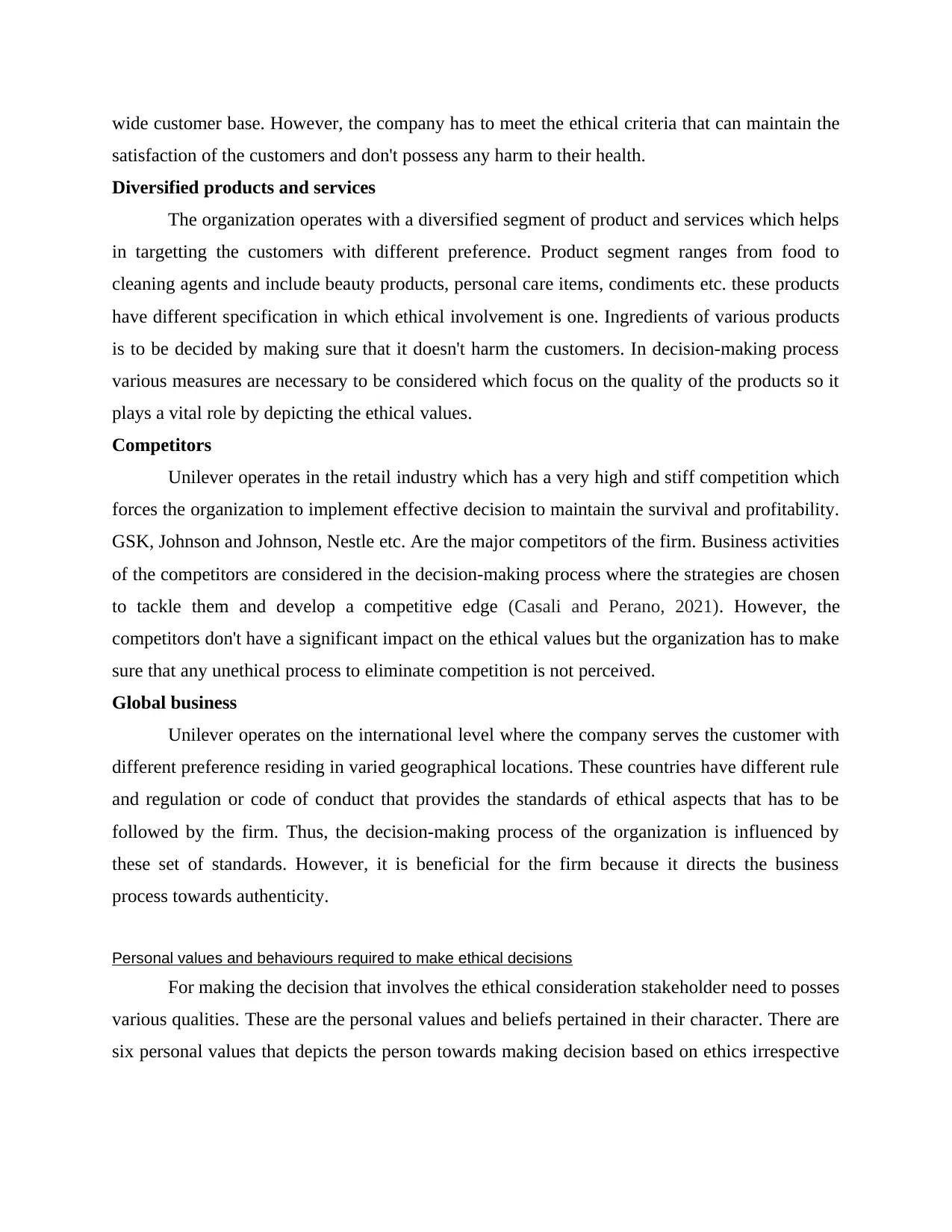
wide customer base. However, the company has to meet the ethical criteria that can maintain the
satisfaction of the customers and don't possess any harm to their health.
Diversified products and services
The organization operates with a diversified segment of product and services which helps
in targetting the customers with different preference. Product segment ranges from food to
cleaning agents and include beauty products, personal care items, condiments etc. these products
have different specification in which ethical involvement is one. Ingredients of various products
is to be decided by making sure that it doesn't harm the customers. In decision-making process
various measures are necessary to be considered which focus on the quality of the products so it
plays a vital role by depicting the ethical values.
Competitors
Unilever operates in the retail industry which has a very high and stiff competition which
forces the organization to implement effective decision to maintain the survival and profitability.
GSK, Johnson and Johnson, Nestle etc. Are the major competitors of the firm. Business activities
of the competitors are considered in the decision-making process where the strategies are chosen
to tackle them and develop a competitive edge (Casali and Perano, 2021). However, the
competitors don't have a significant impact on the ethical values but the organization has to make
sure that any unethical process to eliminate competition is not perceived.
Global business
Unilever operates on the international level where the company serves the customer with
different preference residing in varied geographical locations. These countries have different rule
and regulation or code of conduct that provides the standards of ethical aspects that has to be
followed by the firm. Thus, the decision-making process of the organization is influenced by
these set of standards. However, it is beneficial for the firm because it directs the business
process towards authenticity.
Personal values and behaviours required to make ethical decisions
For making the decision that involves the ethical consideration stakeholder need to posses
various qualities. These are the personal values and beliefs pertained in their character. There are
six personal values that depicts the person towards making decision based on ethics irrespective
satisfaction of the customers and don't possess any harm to their health.
Diversified products and services
The organization operates with a diversified segment of product and services which helps
in targetting the customers with different preference. Product segment ranges from food to
cleaning agents and include beauty products, personal care items, condiments etc. these products
have different specification in which ethical involvement is one. Ingredients of various products
is to be decided by making sure that it doesn't harm the customers. In decision-making process
various measures are necessary to be considered which focus on the quality of the products so it
plays a vital role by depicting the ethical values.
Competitors
Unilever operates in the retail industry which has a very high and stiff competition which
forces the organization to implement effective decision to maintain the survival and profitability.
GSK, Johnson and Johnson, Nestle etc. Are the major competitors of the firm. Business activities
of the competitors are considered in the decision-making process where the strategies are chosen
to tackle them and develop a competitive edge (Casali and Perano, 2021). However, the
competitors don't have a significant impact on the ethical values but the organization has to make
sure that any unethical process to eliminate competition is not perceived.
Global business
Unilever operates on the international level where the company serves the customer with
different preference residing in varied geographical locations. These countries have different rule
and regulation or code of conduct that provides the standards of ethical aspects that has to be
followed by the firm. Thus, the decision-making process of the organization is influenced by
these set of standards. However, it is beneficial for the firm because it directs the business
process towards authenticity.
Personal values and behaviours required to make ethical decisions
For making the decision that involves the ethical consideration stakeholder need to posses
various qualities. These are the personal values and beliefs pertained in their character. There are
six personal values that depicts the person towards making decision based on ethics irrespective
Paraphrase This Document
Need a fresh take? Get an instant paraphrase of this document with our AI Paraphraser
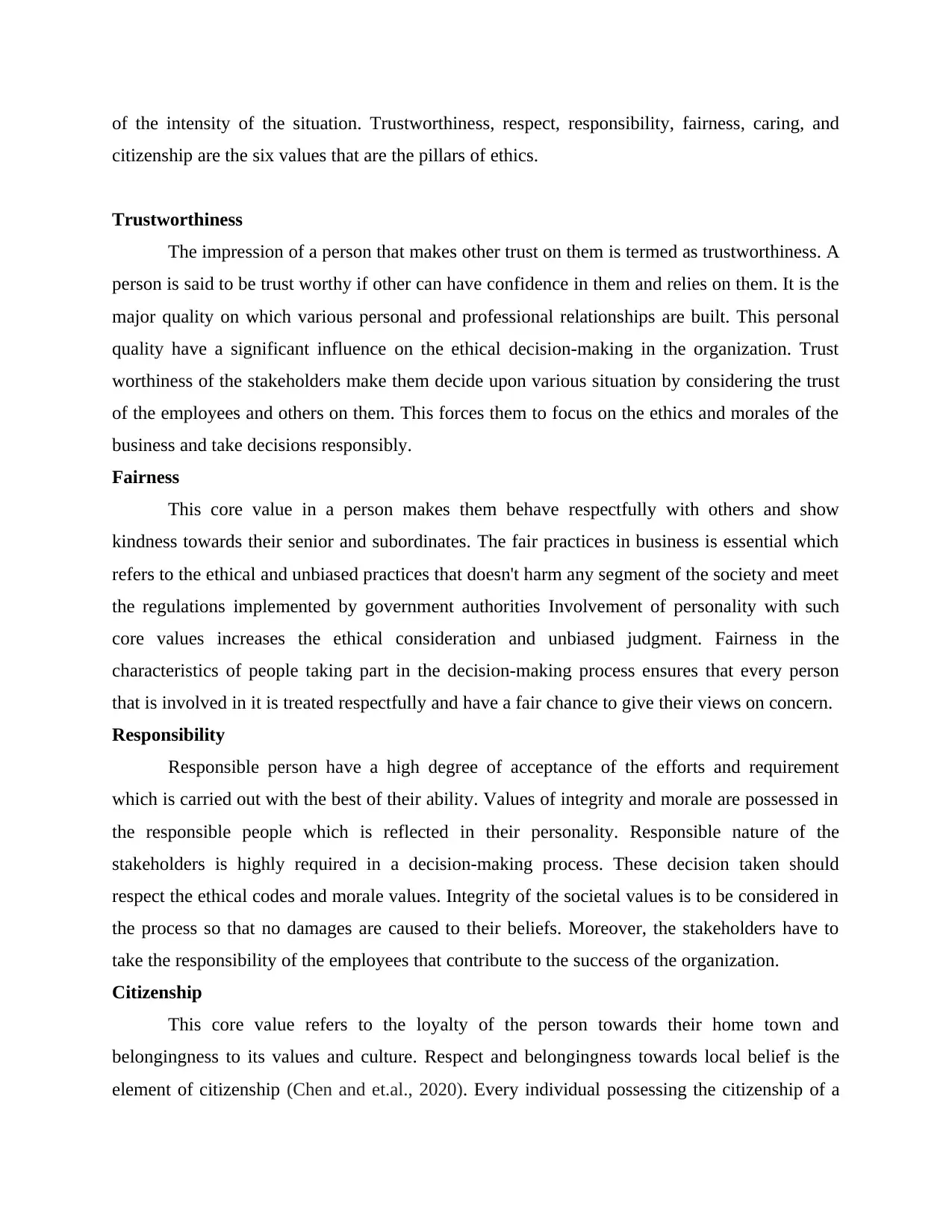
of the intensity of the situation. Trustworthiness, respect, responsibility, fairness, caring, and
citizenship are the six values that are the pillars of ethics.
Trustworthiness
The impression of a person that makes other trust on them is termed as trustworthiness. A
person is said to be trust worthy if other can have confidence in them and relies on them. It is the
major quality on which various personal and professional relationships are built. This personal
quality have a significant influence on the ethical decision-making in the organization. Trust
worthiness of the stakeholders make them decide upon various situation by considering the trust
of the employees and others on them. This forces them to focus on the ethics and morales of the
business and take decisions responsibly.
Fairness
This core value in a person makes them behave respectfully with others and show
kindness towards their senior and subordinates. The fair practices in business is essential which
refers to the ethical and unbiased practices that doesn't harm any segment of the society and meet
the regulations implemented by government authorities Involvement of personality with such
core values increases the ethical consideration and unbiased judgment. Fairness in the
characteristics of people taking part in the decision-making process ensures that every person
that is involved in it is treated respectfully and have a fair chance to give their views on concern.
Responsibility
Responsible person have a high degree of acceptance of the efforts and requirement
which is carried out with the best of their ability. Values of integrity and morale are possessed in
the responsible people which is reflected in their personality. Responsible nature of the
stakeholders is highly required in a decision-making process. These decision taken should
respect the ethical codes and morale values. Integrity of the societal values is to be considered in
the process so that no damages are caused to their beliefs. Moreover, the stakeholders have to
take the responsibility of the employees that contribute to the success of the organization.
Citizenship
This core value refers to the loyalty of the person towards their home town and
belongingness to its values and culture. Respect and belongingness towards local belief is the
element of citizenship (Chen and et.al., 2020). Every individual possessing the citizenship of a
citizenship are the six values that are the pillars of ethics.
Trustworthiness
The impression of a person that makes other trust on them is termed as trustworthiness. A
person is said to be trust worthy if other can have confidence in them and relies on them. It is the
major quality on which various personal and professional relationships are built. This personal
quality have a significant influence on the ethical decision-making in the organization. Trust
worthiness of the stakeholders make them decide upon various situation by considering the trust
of the employees and others on them. This forces them to focus on the ethics and morales of the
business and take decisions responsibly.
Fairness
This core value in a person makes them behave respectfully with others and show
kindness towards their senior and subordinates. The fair practices in business is essential which
refers to the ethical and unbiased practices that doesn't harm any segment of the society and meet
the regulations implemented by government authorities Involvement of personality with such
core values increases the ethical consideration and unbiased judgment. Fairness in the
characteristics of people taking part in the decision-making process ensures that every person
that is involved in it is treated respectfully and have a fair chance to give their views on concern.
Responsibility
Responsible person have a high degree of acceptance of the efforts and requirement
which is carried out with the best of their ability. Values of integrity and morale are possessed in
the responsible people which is reflected in their personality. Responsible nature of the
stakeholders is highly required in a decision-making process. These decision taken should
respect the ethical codes and morale values. Integrity of the societal values is to be considered in
the process so that no damages are caused to their beliefs. Moreover, the stakeholders have to
take the responsibility of the employees that contribute to the success of the organization.
Citizenship
This core value refers to the loyalty of the person towards their home town and
belongingness to its values and culture. Respect and belongingness towards local belief is the
element of citizenship (Chen and et.al., 2020). Every individual possessing the citizenship of a
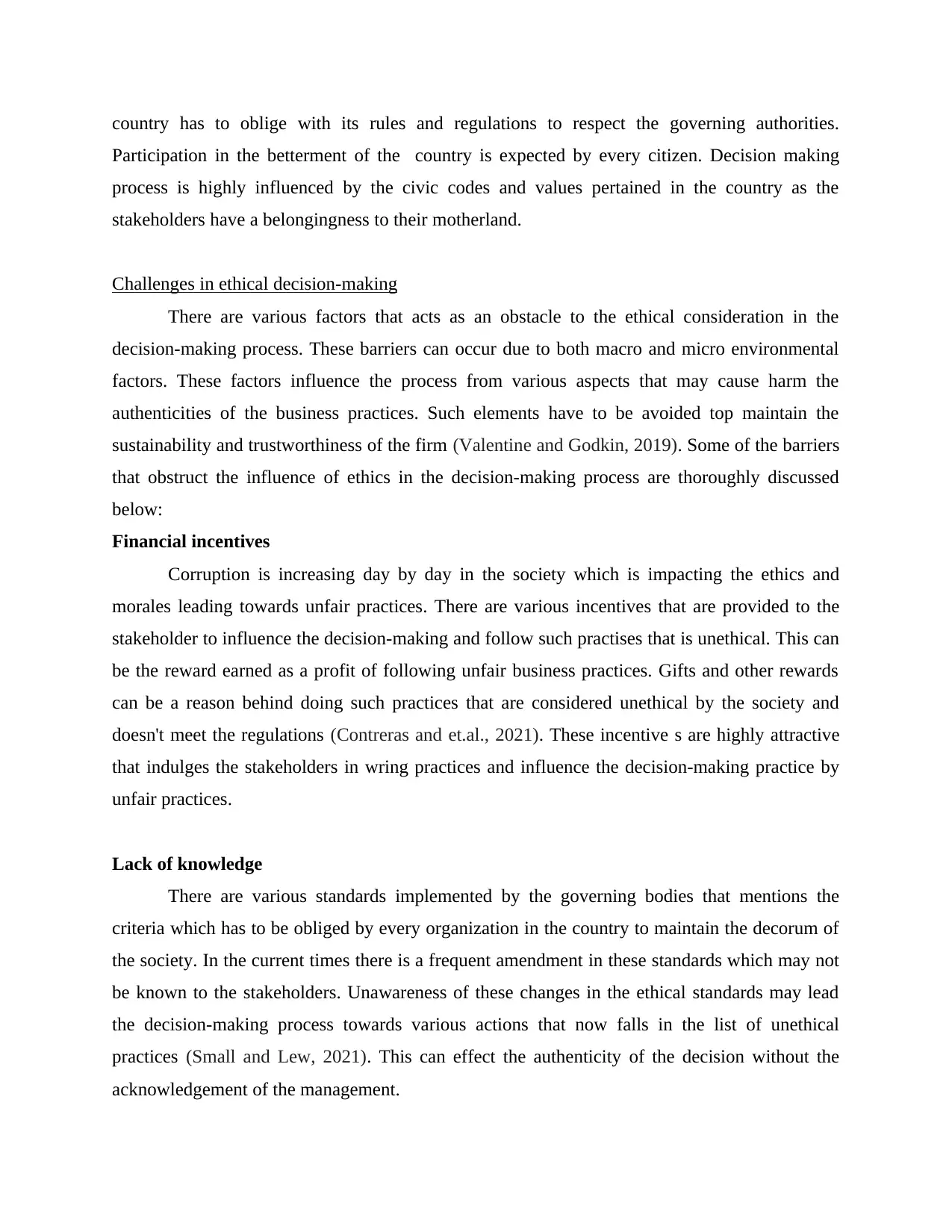
country has to oblige with its rules and regulations to respect the governing authorities.
Participation in the betterment of the country is expected by every citizen. Decision making
process is highly influenced by the civic codes and values pertained in the country as the
stakeholders have a belongingness to their motherland.
Challenges in ethical decision-making
There are various factors that acts as an obstacle to the ethical consideration in the
decision-making process. These barriers can occur due to both macro and micro environmental
factors. These factors influence the process from various aspects that may cause harm the
authenticities of the business practices. Such elements have to be avoided top maintain the
sustainability and trustworthiness of the firm (Valentine and Godkin, 2019). Some of the barriers
that obstruct the influence of ethics in the decision-making process are thoroughly discussed
below:
Financial incentives
Corruption is increasing day by day in the society which is impacting the ethics and
morales leading towards unfair practices. There are various incentives that are provided to the
stakeholder to influence the decision-making and follow such practises that is unethical. This can
be the reward earned as a profit of following unfair business practices. Gifts and other rewards
can be a reason behind doing such practices that are considered unethical by the society and
doesn't meet the regulations (Contreras and et.al., 2021). These incentive s are highly attractive
that indulges the stakeholders in wring practices and influence the decision-making practice by
unfair practices.
Lack of knowledge
There are various standards implemented by the governing bodies that mentions the
criteria which has to be obliged by every organization in the country to maintain the decorum of
the society. In the current times there is a frequent amendment in these standards which may not
be known to the stakeholders. Unawareness of these changes in the ethical standards may lead
the decision-making process towards various actions that now falls in the list of unethical
practices (Small and Lew, 2021). This can effect the authenticity of the decision without the
acknowledgement of the management.
Participation in the betterment of the country is expected by every citizen. Decision making
process is highly influenced by the civic codes and values pertained in the country as the
stakeholders have a belongingness to their motherland.
Challenges in ethical decision-making
There are various factors that acts as an obstacle to the ethical consideration in the
decision-making process. These barriers can occur due to both macro and micro environmental
factors. These factors influence the process from various aspects that may cause harm the
authenticities of the business practices. Such elements have to be avoided top maintain the
sustainability and trustworthiness of the firm (Valentine and Godkin, 2019). Some of the barriers
that obstruct the influence of ethics in the decision-making process are thoroughly discussed
below:
Financial incentives
Corruption is increasing day by day in the society which is impacting the ethics and
morales leading towards unfair practices. There are various incentives that are provided to the
stakeholder to influence the decision-making and follow such practises that is unethical. This can
be the reward earned as a profit of following unfair business practices. Gifts and other rewards
can be a reason behind doing such practices that are considered unethical by the society and
doesn't meet the regulations (Contreras and et.al., 2021). These incentive s are highly attractive
that indulges the stakeholders in wring practices and influence the decision-making practice by
unfair practices.
Lack of knowledge
There are various standards implemented by the governing bodies that mentions the
criteria which has to be obliged by every organization in the country to maintain the decorum of
the society. In the current times there is a frequent amendment in these standards which may not
be known to the stakeholders. Unawareness of these changes in the ethical standards may lead
the decision-making process towards various actions that now falls in the list of unethical
practices (Small and Lew, 2021). This can effect the authenticity of the decision without the
acknowledgement of the management.
⊘ This is a preview!⊘
Do you want full access?
Subscribe today to unlock all pages.

Trusted by 1+ million students worldwide
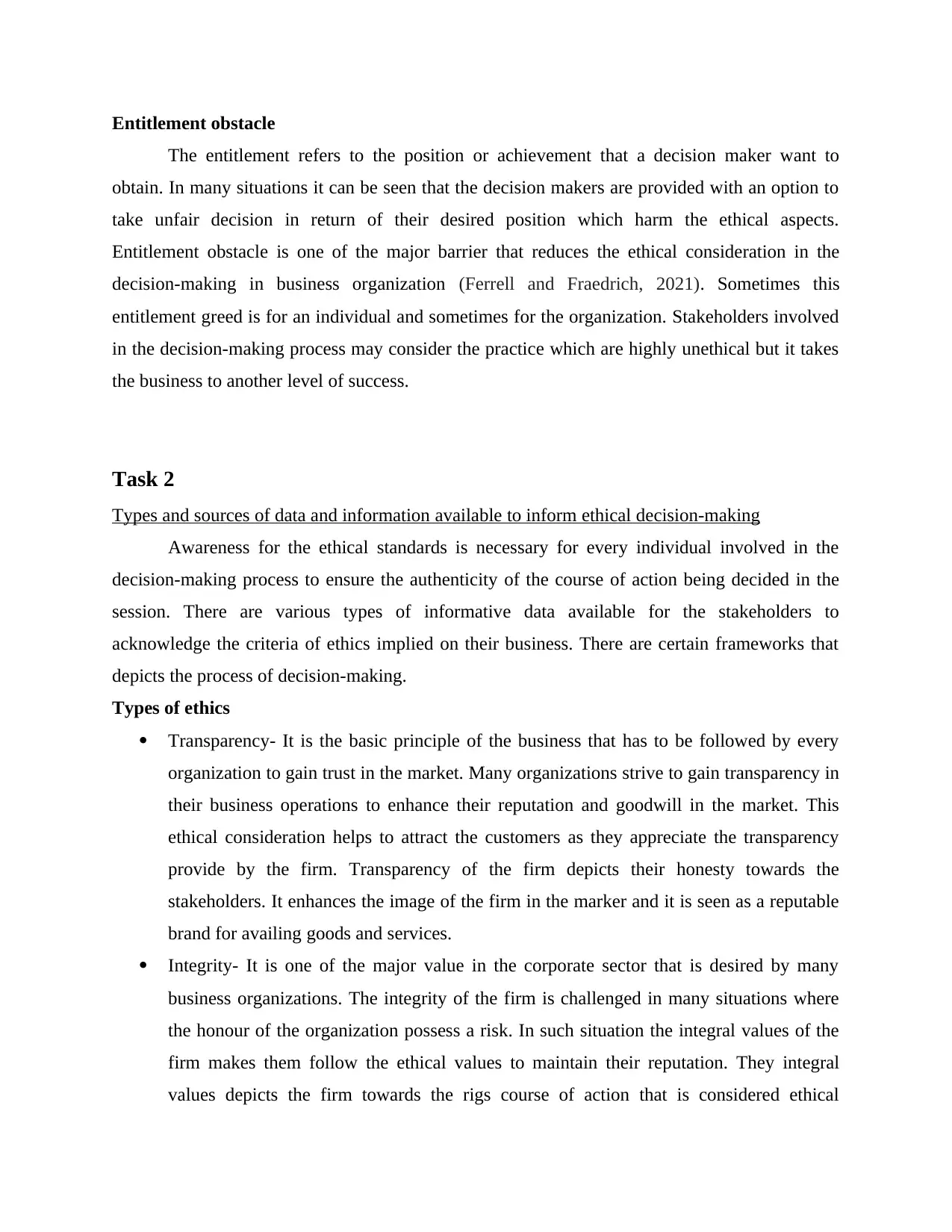
Entitlement obstacle
The entitlement refers to the position or achievement that a decision maker want to
obtain. In many situations it can be seen that the decision makers are provided with an option to
take unfair decision in return of their desired position which harm the ethical aspects.
Entitlement obstacle is one of the major barrier that reduces the ethical consideration in the
decision-making in business organization (Ferrell and Fraedrich, 2021). Sometimes this
entitlement greed is for an individual and sometimes for the organization. Stakeholders involved
in the decision-making process may consider the practice which are highly unethical but it takes
the business to another level of success.
Task 2
Types and sources of data and information available to inform ethical decision-making
Awareness for the ethical standards is necessary for every individual involved in the
decision-making process to ensure the authenticity of the course of action being decided in the
session. There are various types of informative data available for the stakeholders to
acknowledge the criteria of ethics implied on their business. There are certain frameworks that
depicts the process of decision-making.
Types of ethics
Transparency- It is the basic principle of the business that has to be followed by every
organization to gain trust in the market. Many organizations strive to gain transparency in
their business operations to enhance their reputation and goodwill in the market. This
ethical consideration helps to attract the customers as they appreciate the transparency
provide by the firm. Transparency of the firm depicts their honesty towards the
stakeholders. It enhances the image of the firm in the marker and it is seen as a reputable
brand for availing goods and services.
Integrity- It is one of the major value in the corporate sector that is desired by many
business organizations. The integrity of the firm is challenged in many situations where
the honour of the organization possess a risk. In such situation the integral values of the
firm makes them follow the ethical values to maintain their reputation. They integral
values depicts the firm towards the rigs course of action that is considered ethical
The entitlement refers to the position or achievement that a decision maker want to
obtain. In many situations it can be seen that the decision makers are provided with an option to
take unfair decision in return of their desired position which harm the ethical aspects.
Entitlement obstacle is one of the major barrier that reduces the ethical consideration in the
decision-making in business organization (Ferrell and Fraedrich, 2021). Sometimes this
entitlement greed is for an individual and sometimes for the organization. Stakeholders involved
in the decision-making process may consider the practice which are highly unethical but it takes
the business to another level of success.
Task 2
Types and sources of data and information available to inform ethical decision-making
Awareness for the ethical standards is necessary for every individual involved in the
decision-making process to ensure the authenticity of the course of action being decided in the
session. There are various types of informative data available for the stakeholders to
acknowledge the criteria of ethics implied on their business. There are certain frameworks that
depicts the process of decision-making.
Types of ethics
Transparency- It is the basic principle of the business that has to be followed by every
organization to gain trust in the market. Many organizations strive to gain transparency in
their business operations to enhance their reputation and goodwill in the market. This
ethical consideration helps to attract the customers as they appreciate the transparency
provide by the firm. Transparency of the firm depicts their honesty towards the
stakeholders. It enhances the image of the firm in the marker and it is seen as a reputable
brand for availing goods and services.
Integrity- It is one of the major value in the corporate sector that is desired by many
business organizations. The integrity of the firm is challenged in many situations where
the honour of the organization possess a risk. In such situation the integral values of the
firm makes them follow the ethical values to maintain their reputation. They integral
values depicts the firm towards the rigs course of action that is considered ethical
Paraphrase This Document
Need a fresh take? Get an instant paraphrase of this document with our AI Paraphraser
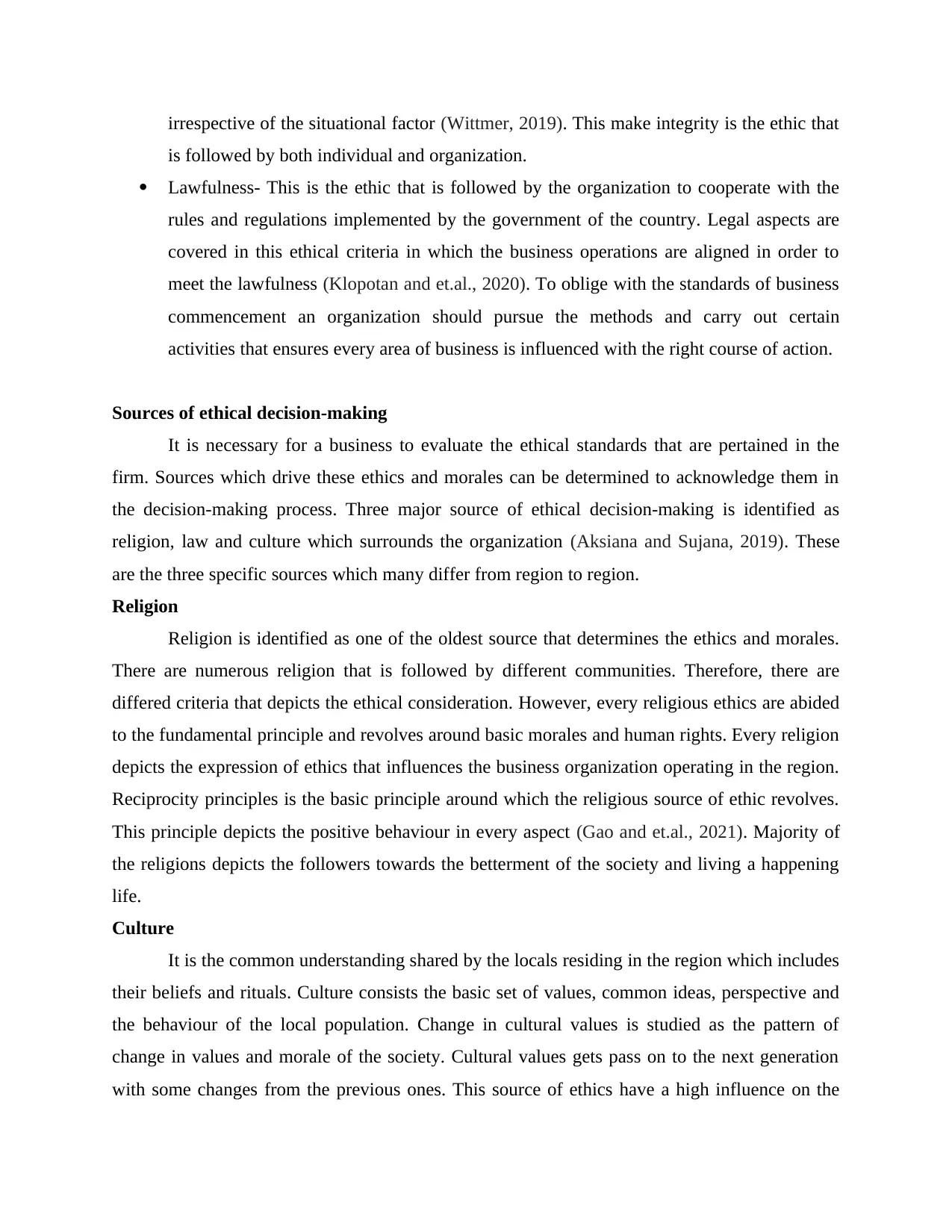
irrespective of the situational factor (Wittmer, 2019). This make integrity is the ethic that
is followed by both individual and organization.
Lawfulness- This is the ethic that is followed by the organization to cooperate with the
rules and regulations implemented by the government of the country. Legal aspects are
covered in this ethical criteria in which the business operations are aligned in order to
meet the lawfulness (Klopotan and et.al., 2020). To oblige with the standards of business
commencement an organization should pursue the methods and carry out certain
activities that ensures every area of business is influenced with the right course of action.
Sources of ethical decision-making
It is necessary for a business to evaluate the ethical standards that are pertained in the
firm. Sources which drive these ethics and morales can be determined to acknowledge them in
the decision-making process. Three major source of ethical decision-making is identified as
religion, law and culture which surrounds the organization (Aksiana and Sujana, 2019). These
are the three specific sources which many differ from region to region.
Religion
Religion is identified as one of the oldest source that determines the ethics and morales.
There are numerous religion that is followed by different communities. Therefore, there are
differed criteria that depicts the ethical consideration. However, every religious ethics are abided
to the fundamental principle and revolves around basic morales and human rights. Every religion
depicts the expression of ethics that influences the business organization operating in the region.
Reciprocity principles is the basic principle around which the religious source of ethic revolves.
This principle depicts the positive behaviour in every aspect (Gao and et.al., 2021). Majority of
the religions depicts the followers towards the betterment of the society and living a happening
life.
Culture
It is the common understanding shared by the locals residing in the region which includes
their beliefs and rituals. Culture consists the basic set of values, common ideas, perspective and
the behaviour of the local population. Change in cultural values is studied as the pattern of
change in values and morale of the society. Cultural values gets pass on to the next generation
with some changes from the previous ones. This source of ethics have a high influence on the
is followed by both individual and organization.
Lawfulness- This is the ethic that is followed by the organization to cooperate with the
rules and regulations implemented by the government of the country. Legal aspects are
covered in this ethical criteria in which the business operations are aligned in order to
meet the lawfulness (Klopotan and et.al., 2020). To oblige with the standards of business
commencement an organization should pursue the methods and carry out certain
activities that ensures every area of business is influenced with the right course of action.
Sources of ethical decision-making
It is necessary for a business to evaluate the ethical standards that are pertained in the
firm. Sources which drive these ethics and morales can be determined to acknowledge them in
the decision-making process. Three major source of ethical decision-making is identified as
religion, law and culture which surrounds the organization (Aksiana and Sujana, 2019). These
are the three specific sources which many differ from region to region.
Religion
Religion is identified as one of the oldest source that determines the ethics and morales.
There are numerous religion that is followed by different communities. Therefore, there are
differed criteria that depicts the ethical consideration. However, every religious ethics are abided
to the fundamental principle and revolves around basic morales and human rights. Every religion
depicts the expression of ethics that influences the business organization operating in the region.
Reciprocity principles is the basic principle around which the religious source of ethic revolves.
This principle depicts the positive behaviour in every aspect (Gao and et.al., 2021). Majority of
the religions depicts the followers towards the betterment of the society and living a happening
life.
Culture
It is the common understanding shared by the locals residing in the region which includes
their beliefs and rituals. Culture consists the basic set of values, common ideas, perspective and
the behaviour of the local population. Change in cultural values is studied as the pattern of
change in values and morale of the society. Cultural values gets pass on to the next generation
with some changes from the previous ones. This source of ethics have a high influence on the
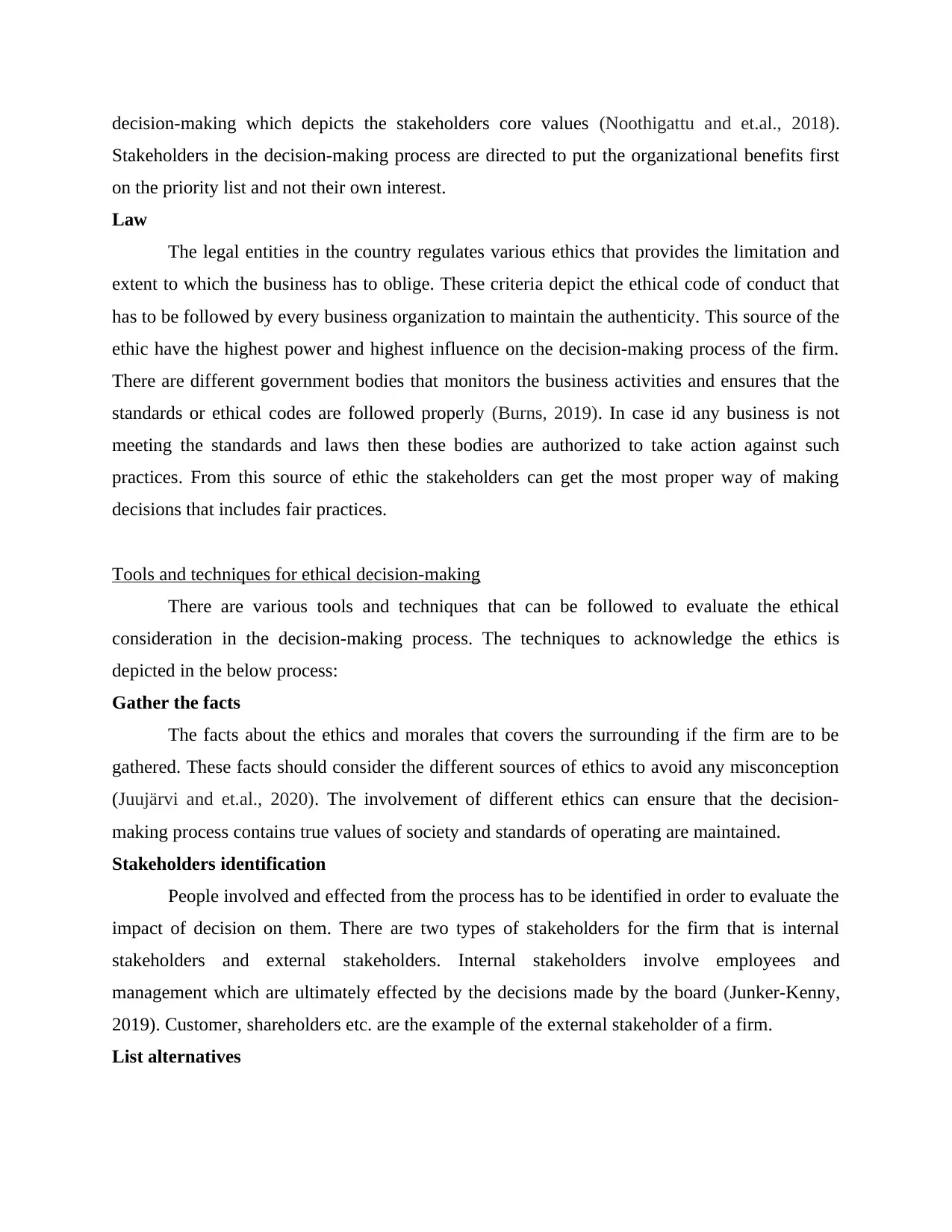
decision-making which depicts the stakeholders core values (Noothigattu and et.al., 2018).
Stakeholders in the decision-making process are directed to put the organizational benefits first
on the priority list and not their own interest.
Law
The legal entities in the country regulates various ethics that provides the limitation and
extent to which the business has to oblige. These criteria depict the ethical code of conduct that
has to be followed by every business organization to maintain the authenticity. This source of the
ethic have the highest power and highest influence on the decision-making process of the firm.
There are different government bodies that monitors the business activities and ensures that the
standards or ethical codes are followed properly (Burns, 2019). In case id any business is not
meeting the standards and laws then these bodies are authorized to take action against such
practices. From this source of ethic the stakeholders can get the most proper way of making
decisions that includes fair practices.
Tools and techniques for ethical decision-making
There are various tools and techniques that can be followed to evaluate the ethical
consideration in the decision-making process. The techniques to acknowledge the ethics is
depicted in the below process:
Gather the facts
The facts about the ethics and morales that covers the surrounding if the firm are to be
gathered. These facts should consider the different sources of ethics to avoid any misconception
(Juujärvi and et.al., 2020). The involvement of different ethics can ensure that the decision-
making process contains true values of society and standards of operating are maintained.
Stakeholders identification
People involved and effected from the process has to be identified in order to evaluate the
impact of decision on them. There are two types of stakeholders for the firm that is internal
stakeholders and external stakeholders. Internal stakeholders involve employees and
management which are ultimately effected by the decisions made by the board (Junker-Kenny,
2019). Customer, shareholders etc. are the example of the external stakeholder of a firm.
List alternatives
Stakeholders in the decision-making process are directed to put the organizational benefits first
on the priority list and not their own interest.
Law
The legal entities in the country regulates various ethics that provides the limitation and
extent to which the business has to oblige. These criteria depict the ethical code of conduct that
has to be followed by every business organization to maintain the authenticity. This source of the
ethic have the highest power and highest influence on the decision-making process of the firm.
There are different government bodies that monitors the business activities and ensures that the
standards or ethical codes are followed properly (Burns, 2019). In case id any business is not
meeting the standards and laws then these bodies are authorized to take action against such
practices. From this source of ethic the stakeholders can get the most proper way of making
decisions that includes fair practices.
Tools and techniques for ethical decision-making
There are various tools and techniques that can be followed to evaluate the ethical
consideration in the decision-making process. The techniques to acknowledge the ethics is
depicted in the below process:
Gather the facts
The facts about the ethics and morales that covers the surrounding if the firm are to be
gathered. These facts should consider the different sources of ethics to avoid any misconception
(Juujärvi and et.al., 2020). The involvement of different ethics can ensure that the decision-
making process contains true values of society and standards of operating are maintained.
Stakeholders identification
People involved and effected from the process has to be identified in order to evaluate the
impact of decision on them. There are two types of stakeholders for the firm that is internal
stakeholders and external stakeholders. Internal stakeholders involve employees and
management which are ultimately effected by the decisions made by the board (Junker-Kenny,
2019). Customer, shareholders etc. are the example of the external stakeholder of a firm.
List alternatives
⊘ This is a preview!⊘
Do you want full access?
Subscribe today to unlock all pages.

Trusted by 1+ million students worldwide

Course of action that are available for the firm has to be mentioned so that each one can
be analysed properly (Baiasu, 2020). These are the alternatives whose efficiency and ethics has
to be mentioned to avoid the engagement of unfair practices.
Compare alternatives
The list of alternative is then evaluated to determine the viability of each to ensure its
successful implementation (Faghihi and et.al., 2021). Here the alternatives gets listed according
to their suitability to the situational needs. Comparison of the alternatives highlight the pros and
cons of each available option.
Weigh the consequences
On this step, the consequence of choosing the alternative is evaluated in terms of the
ethical aspects. These consequences can be both positive or negative (Caplan, 2020). The
weighing process includes measuring the course of actions from different perspectives so that
any segment of the business environment doesn't get harm.
Decision
Authorities involved in the decision-making process oversees these process of analysing
the alternatives in ethical context and then gives their respective judgements. Perspective of
every individual is considered and then the decision taken is implemented in the organization
(Jafari Rad and et.al., 2020). This technique of ethical decision-making ensures the authenticity
of the organization and can lead it towards achievement of enhanced goodwill.
The justification for the ethical decision made
Through the above discussion indicating the tools & techniques that are used while making
decisions ethically it has been realized that when the management of the organization resorts to
ethical decision making, then the process involves evaluation of all the available alternative
keeping in mind the ethical values of the organization as well as the society as a whole and
accordingly, that alternative is selected which is most consistent with the ethical principles
applicable & followed by the organization. Further, when ethical decisions are made,
management perception involves elimination of all those options that they perceive to be
necessarily unethical and therefore, make selection of the most ethical option.
Ethical decision making in business facilitates enhancement of law by outlining the
behaviour of employees that is acceptable by the organization. This led to the establishment of
be analysed properly (Baiasu, 2020). These are the alternatives whose efficiency and ethics has
to be mentioned to avoid the engagement of unfair practices.
Compare alternatives
The list of alternative is then evaluated to determine the viability of each to ensure its
successful implementation (Faghihi and et.al., 2021). Here the alternatives gets listed according
to their suitability to the situational needs. Comparison of the alternatives highlight the pros and
cons of each available option.
Weigh the consequences
On this step, the consequence of choosing the alternative is evaluated in terms of the
ethical aspects. These consequences can be both positive or negative (Caplan, 2020). The
weighing process includes measuring the course of actions from different perspectives so that
any segment of the business environment doesn't get harm.
Decision
Authorities involved in the decision-making process oversees these process of analysing
the alternatives in ethical context and then gives their respective judgements. Perspective of
every individual is considered and then the decision taken is implemented in the organization
(Jafari Rad and et.al., 2020). This technique of ethical decision-making ensures the authenticity
of the organization and can lead it towards achievement of enhanced goodwill.
The justification for the ethical decision made
Through the above discussion indicating the tools & techniques that are used while making
decisions ethically it has been realized that when the management of the organization resorts to
ethical decision making, then the process involves evaluation of all the available alternative
keeping in mind the ethical values of the organization as well as the society as a whole and
accordingly, that alternative is selected which is most consistent with the ethical principles
applicable & followed by the organization. Further, when ethical decisions are made,
management perception involves elimination of all those options that they perceive to be
necessarily unethical and therefore, make selection of the most ethical option.
Ethical decision making in business facilitates enhancement of law by outlining the
behaviour of employees that is acceptable by the organization. This led to the establishment of
Paraphrase This Document
Need a fresh take? Get an instant paraphrase of this document with our AI Paraphraser
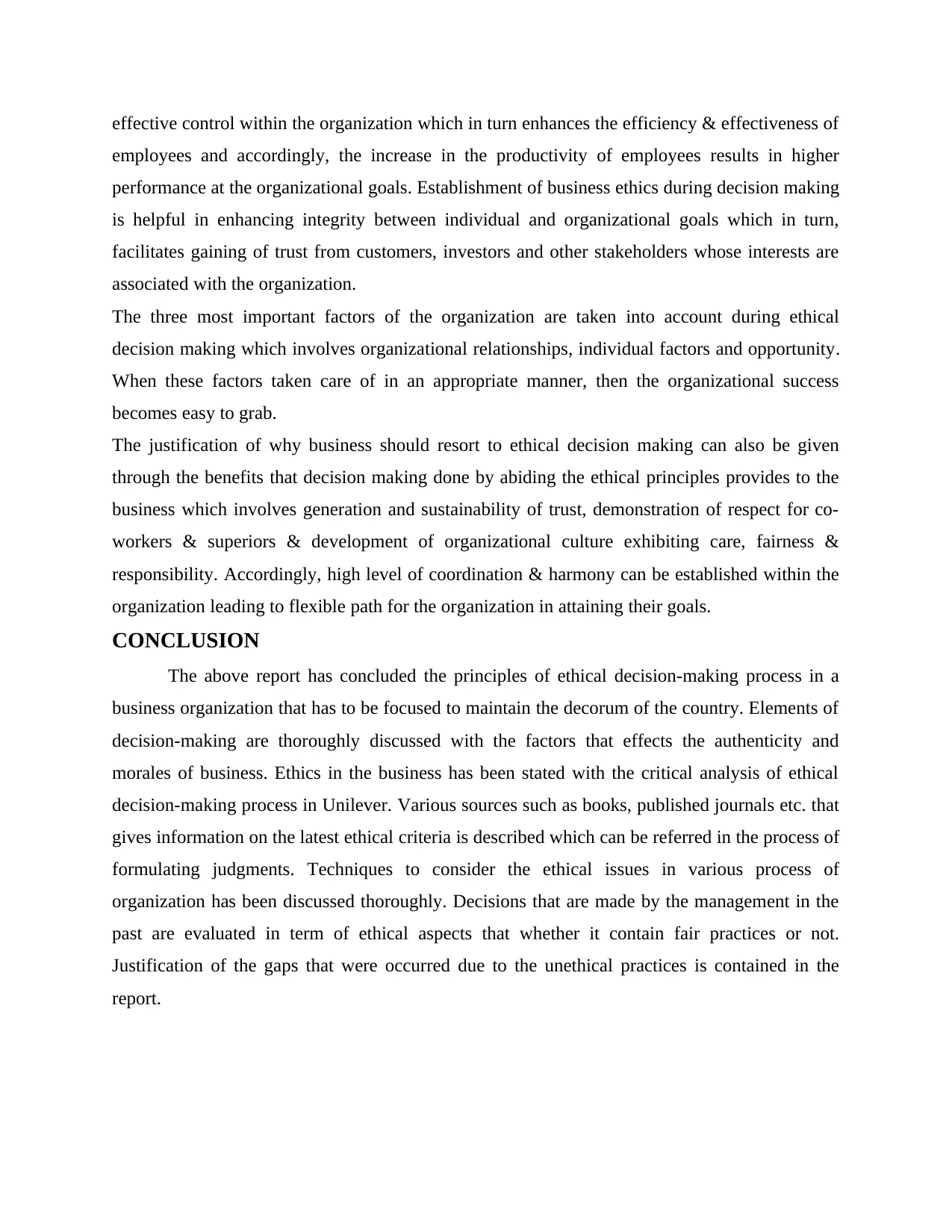
effective control within the organization which in turn enhances the efficiency & effectiveness of
employees and accordingly, the increase in the productivity of employees results in higher
performance at the organizational goals. Establishment of business ethics during decision making
is helpful in enhancing integrity between individual and organizational goals which in turn,
facilitates gaining of trust from customers, investors and other stakeholders whose interests are
associated with the organization.
The three most important factors of the organization are taken into account during ethical
decision making which involves organizational relationships, individual factors and opportunity.
When these factors taken care of in an appropriate manner, then the organizational success
becomes easy to grab.
The justification of why business should resort to ethical decision making can also be given
through the benefits that decision making done by abiding the ethical principles provides to the
business which involves generation and sustainability of trust, demonstration of respect for co-
workers & superiors & development of organizational culture exhibiting care, fairness &
responsibility. Accordingly, high level of coordination & harmony can be established within the
organization leading to flexible path for the organization in attaining their goals.
CONCLUSION
The above report has concluded the principles of ethical decision-making process in a
business organization that has to be focused to maintain the decorum of the country. Elements of
decision-making are thoroughly discussed with the factors that effects the authenticity and
morales of business. Ethics in the business has been stated with the critical analysis of ethical
decision-making process in Unilever. Various sources such as books, published journals etc. that
gives information on the latest ethical criteria is described which can be referred in the process of
formulating judgments. Techniques to consider the ethical issues in various process of
organization has been discussed thoroughly. Decisions that are made by the management in the
past are evaluated in term of ethical aspects that whether it contain fair practices or not.
Justification of the gaps that were occurred due to the unethical practices is contained in the
report.
employees and accordingly, the increase in the productivity of employees results in higher
performance at the organizational goals. Establishment of business ethics during decision making
is helpful in enhancing integrity between individual and organizational goals which in turn,
facilitates gaining of trust from customers, investors and other stakeholders whose interests are
associated with the organization.
The three most important factors of the organization are taken into account during ethical
decision making which involves organizational relationships, individual factors and opportunity.
When these factors taken care of in an appropriate manner, then the organizational success
becomes easy to grab.
The justification of why business should resort to ethical decision making can also be given
through the benefits that decision making done by abiding the ethical principles provides to the
business which involves generation and sustainability of trust, demonstration of respect for co-
workers & superiors & development of organizational culture exhibiting care, fairness &
responsibility. Accordingly, high level of coordination & harmony can be established within the
organization leading to flexible path for the organization in attaining their goals.
CONCLUSION
The above report has concluded the principles of ethical decision-making process in a
business organization that has to be focused to maintain the decorum of the country. Elements of
decision-making are thoroughly discussed with the factors that effects the authenticity and
morales of business. Ethics in the business has been stated with the critical analysis of ethical
decision-making process in Unilever. Various sources such as books, published journals etc. that
gives information on the latest ethical criteria is described which can be referred in the process of
formulating judgments. Techniques to consider the ethical issues in various process of
organization has been discussed thoroughly. Decisions that are made by the management in the
past are evaluated in term of ethical aspects that whether it contain fair practices or not.
Justification of the gaps that were occurred due to the unethical practices is contained in the
report.
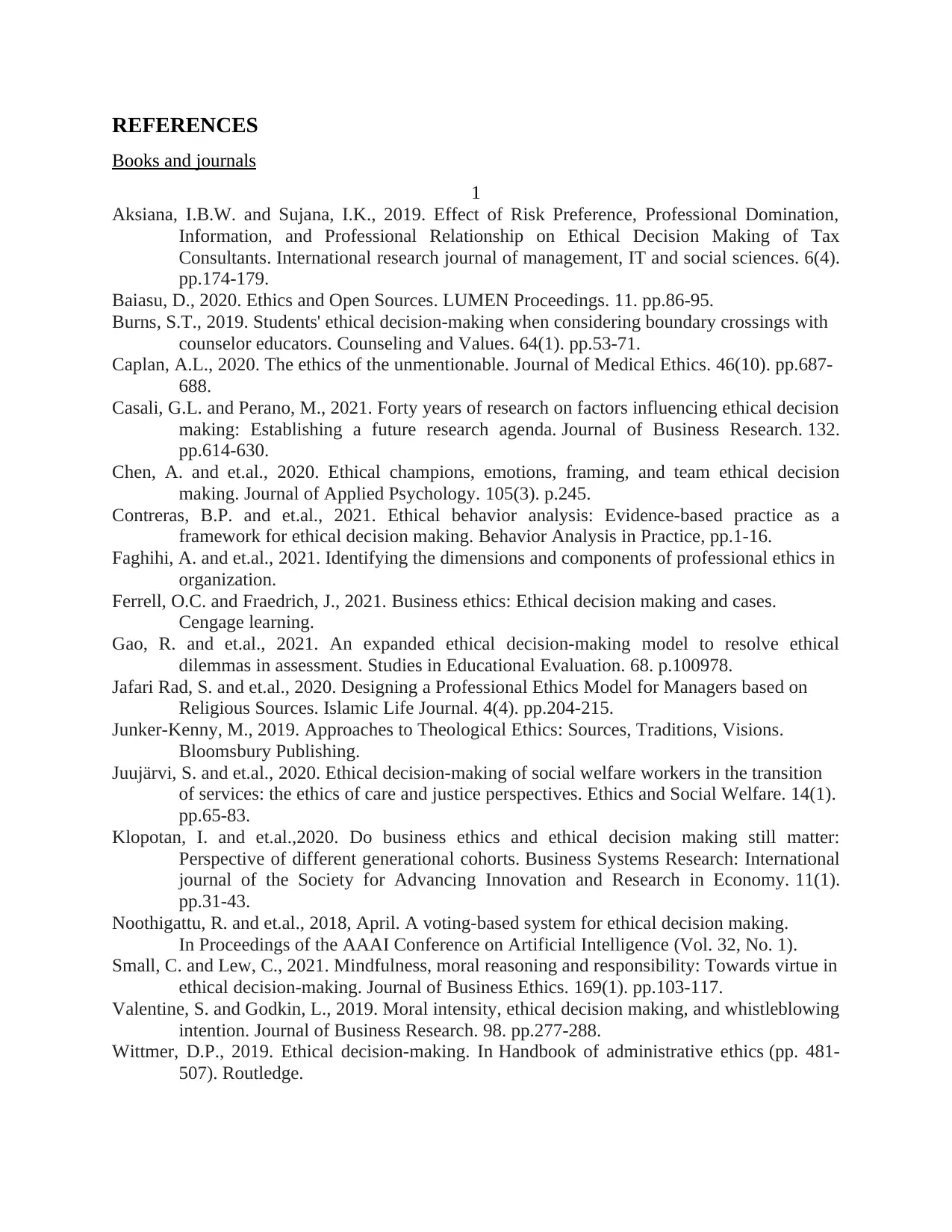
REFERENCES
Books and journals
1
Aksiana, I.B.W. and Sujana, I.K., 2019. Effect of Risk Preference, Professional Domination,
Information, and Professional Relationship on Ethical Decision Making of Tax
Consultants. International research journal of management, IT and social sciences. 6(4).
pp.174-179.
Baiasu, D., 2020. Ethics and Open Sources. LUMEN Proceedings. 11. pp.86-95.
Burns, S.T., 2019. Students' ethical decision‐making when considering boundary crossings with
counselor educators. Counseling and Values. 64(1). pp.53-71.
Caplan, A.L., 2020. The ethics of the unmentionable. Journal of Medical Ethics. 46(10). pp.687-
688.
Casali, G.L. and Perano, M., 2021. Forty years of research on factors influencing ethical decision
making: Establishing a future research agenda. Journal of Business Research. 132.
pp.614-630.
Chen, A. and et.al., 2020. Ethical champions, emotions, framing, and team ethical decision
making. Journal of Applied Psychology. 105(3). p.245.
Contreras, B.P. and et.al., 2021. Ethical behavior analysis: Evidence-based practice as a
framework for ethical decision making. Behavior Analysis in Practice, pp.1-16.
Faghihi, A. and et.al., 2021. Identifying the dimensions and components of professional ethics in
organization.
Ferrell, O.C. and Fraedrich, J., 2021. Business ethics: Ethical decision making and cases.
Cengage learning.
Gao, R. and et.al., 2021. An expanded ethical decision-making model to resolve ethical
dilemmas in assessment. Studies in Educational Evaluation. 68. p.100978.
Jafari Rad, S. and et.al., 2020. Designing a Professional Ethics Model for Managers based on
Religious Sources. Islamic Life Journal. 4(4). pp.204-215.
Junker-Kenny, M., 2019. Approaches to Theological Ethics: Sources, Traditions, Visions.
Bloomsbury Publishing.
Juujärvi, S. and et.al., 2020. Ethical decision-making of social welfare workers in the transition
of services: the ethics of care and justice perspectives. Ethics and Social Welfare. 14(1).
pp.65-83.
Klopotan, I. and et.al.,2020. Do business ethics and ethical decision making still matter:
Perspective of different generational cohorts. Business Systems Research: International
journal of the Society for Advancing Innovation and Research in Economy. 11(1).
pp.31-43.
Noothigattu, R. and et.al., 2018, April. A voting-based system for ethical decision making.
In Proceedings of the AAAI Conference on Artificial Intelligence (Vol. 32, No. 1).
Small, C. and Lew, C., 2021. Mindfulness, moral reasoning and responsibility: Towards virtue in
ethical decision-making. Journal of Business Ethics. 169(1). pp.103-117.
Valentine, S. and Godkin, L., 2019. Moral intensity, ethical decision making, and whistleblowing
intention. Journal of Business Research. 98. pp.277-288.
Wittmer, D.P., 2019. Ethical decision-making. In Handbook of administrative ethics (pp. 481-
507). Routledge.
Books and journals
1
Aksiana, I.B.W. and Sujana, I.K., 2019. Effect of Risk Preference, Professional Domination,
Information, and Professional Relationship on Ethical Decision Making of Tax
Consultants. International research journal of management, IT and social sciences. 6(4).
pp.174-179.
Baiasu, D., 2020. Ethics and Open Sources. LUMEN Proceedings. 11. pp.86-95.
Burns, S.T., 2019. Students' ethical decision‐making when considering boundary crossings with
counselor educators. Counseling and Values. 64(1). pp.53-71.
Caplan, A.L., 2020. The ethics of the unmentionable. Journal of Medical Ethics. 46(10). pp.687-
688.
Casali, G.L. and Perano, M., 2021. Forty years of research on factors influencing ethical decision
making: Establishing a future research agenda. Journal of Business Research. 132.
pp.614-630.
Chen, A. and et.al., 2020. Ethical champions, emotions, framing, and team ethical decision
making. Journal of Applied Psychology. 105(3). p.245.
Contreras, B.P. and et.al., 2021. Ethical behavior analysis: Evidence-based practice as a
framework for ethical decision making. Behavior Analysis in Practice, pp.1-16.
Faghihi, A. and et.al., 2021. Identifying the dimensions and components of professional ethics in
organization.
Ferrell, O.C. and Fraedrich, J., 2021. Business ethics: Ethical decision making and cases.
Cengage learning.
Gao, R. and et.al., 2021. An expanded ethical decision-making model to resolve ethical
dilemmas in assessment. Studies in Educational Evaluation. 68. p.100978.
Jafari Rad, S. and et.al., 2020. Designing a Professional Ethics Model for Managers based on
Religious Sources. Islamic Life Journal. 4(4). pp.204-215.
Junker-Kenny, M., 2019. Approaches to Theological Ethics: Sources, Traditions, Visions.
Bloomsbury Publishing.
Juujärvi, S. and et.al., 2020. Ethical decision-making of social welfare workers in the transition
of services: the ethics of care and justice perspectives. Ethics and Social Welfare. 14(1).
pp.65-83.
Klopotan, I. and et.al.,2020. Do business ethics and ethical decision making still matter:
Perspective of different generational cohorts. Business Systems Research: International
journal of the Society for Advancing Innovation and Research in Economy. 11(1).
pp.31-43.
Noothigattu, R. and et.al., 2018, April. A voting-based system for ethical decision making.
In Proceedings of the AAAI Conference on Artificial Intelligence (Vol. 32, No. 1).
Small, C. and Lew, C., 2021. Mindfulness, moral reasoning and responsibility: Towards virtue in
ethical decision-making. Journal of Business Ethics. 169(1). pp.103-117.
Valentine, S. and Godkin, L., 2019. Moral intensity, ethical decision making, and whistleblowing
intention. Journal of Business Research. 98. pp.277-288.
Wittmer, D.P., 2019. Ethical decision-making. In Handbook of administrative ethics (pp. 481-
507). Routledge.
⊘ This is a preview!⊘
Do you want full access?
Subscribe today to unlock all pages.

Trusted by 1+ million students worldwide
1 out of 12
Related Documents
Your All-in-One AI-Powered Toolkit for Academic Success.
+13062052269
info@desklib.com
Available 24*7 on WhatsApp / Email
![[object Object]](/_next/static/media/star-bottom.7253800d.svg)
Unlock your academic potential
Copyright © 2020–2026 A2Z Services. All Rights Reserved. Developed and managed by ZUCOL.





